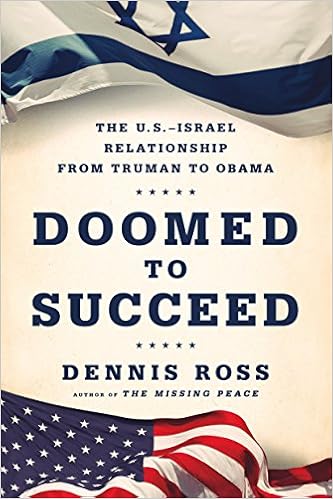
Diplomat and former national Security Council member Dennis Ross has busted three important myths that have been guiding U.S. –Israeli policy since 1948. They are:
1) Distance from Israel engenders Arab cooperation towards the U.S. Ross convincingly notes that Arab states follow their own national interest irrespective of U.S. relations with Israel.
2) U.S. cooperation with Israel will lose Arab support. Fails for the same reason as above. And it doesn’t explain the growing Israeli-Saudi rapprochement.
3) Solving the Israeli-Palestinian issue will lead to a transformation of the Middle East. This myth obviously fails because settling that issue has nothing to do with the ongoing Sunni-Shia split.
Ross presents us with a clear-eyed view of U.S. –Israeli relations since 1948 as he thoughtfully reviews the policies of all of the presidents from Truman to Obama. Ross had a ringside seat in the formation of policy from Carter to Obama and he worked for all of the presidents since Carter with the exception of George W. Bush in various Pentagon, State and National Security Council capacities where he was for the most part up to his eyeballs in U.S. – Israeli relations. Of special note for me was that he worked for the legendary Andrew Marshall in the Pentagon’s Office of Net Assessment and he was Director of Policy Planning in the State Department. He is especially good when he was “inside the room” where the decisions were actually made.
He characterizes the various administrations as having policies of either cooperation or competition with Israel and those policies typically alternated. For example Truman was cooperative while Eisenhower was competitive; both Kennedy and Johnson were cooperative while Nixon initially was competitive. However when Nixon saw the potential of Soviet arms winning the 1973 war, he tilted dramatically in favor of Israel. Thus objectively he was cooperative. On the other hand, in Ross’ view, Carter was outright hostile to Israel. Ross theorizes that Carter felt so guilty about not fully supporting the civil rights revolution in his home state of Georgia; he tilted U.S. policy towards the Palestinians. In contrast Reagan had a deep affinity towards Israel establishing a strategic cooperation arrangement. However that did not stop him in pushing through the AWACS deal over Israeli opposition and in censuring Israel for its invasion of Lebanon.
Although President George H.W. Bush moved the relationship back towards a more competitive one and was extremely unpopular with American Jewry, he continued the strategic cooperation agreement and worked a diplomatic miracle in keeping Israel out of the Iraq War all the while Israel was under rocket attack. Ross has extraordinarily kind words for the first President Bush.
President Clinton also had a deep affinity for Israel and thought of Israeli President Rabin as the father he didn’t have. He was crushed when Rabin was assassinated. He also learned not to trust the Palestinians after a series of Camp David meetings.
President George W. Bush continued the cooperative relationship with Israel while President Obama continued the high degree of cooperation on the military side; he was far from cooperative on the diplomatic side. On his first trip to the Middle East for his Cairo speech, he intentionally avoided going to Israel. Ross’ book ends before the U.S. abstention on the Security Council resolution condemning Israel for its settlement policy.
Two thoughts come through loud and clear from Ross’ important book. First the Israeli’s live up to their biblical forebears by being a “stiff-necked people.” It is hard to make a deal giving up tangible land for an intangible peace. In contrast the Palestinians come across a duplicitous. They say the right words, but when it comes down to it, they won’t make a deal. For them it remains “from the river to the sea.” They just can’t accept Israel as a Jewish State.
Ross has written an important book that should be read by all serious students of the Middle East. I highly recommend it.
No comments:
Post a Comment